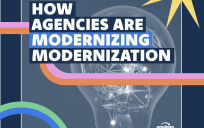 Government leaders need current, accurate information to make smart decisions. Interacting with real-time data helps decision-makers fully understand what’s working and what’s not. But what about the public? The use of AI and open data holds great potential for communicating important information to residents.
Government leaders need current, accurate information to make smart decisions. Interacting with real-time data helps decision-makers fully understand what’s working and what’s not. But what about the public? The use of AI and open data holds great potential for communicating important information to residents.
AI for Agencies
AI and machine learning are gaining momentum in helping public agencies at all levels contextualize data, identify commonalities, and recognize patters for important insight. This has been highlighted in recent GovLoop posts such as AI: Where We Stand and Where We’re Going in Government, and How Best to Use AI: Human + Machine.
Digital Maturity Includes the Public
Digital maturity in the public sector, however, isn’t just about internal strategies. All areas of government interaction with data, including operations, connecting with partners, and connecting with residents, benefit from modern technologies that are prevalent in our everyday private lives.
Full digital maturity in resident engagement includes:
- Customizable, mobile, digital experiences with government that match private-world experiences;
- Public self-service to conduct business through a single, constituent portal 24/7, or self-report issues; and
- Public access to the same quality of real-time data surfaced through effective internal data sharing and aggregation.
While departments are using AI and machine learning to ask – and answer – the questions that matter most to our communities such as, “what’s working to address homelessness?” residents have their own questions. And these questions can be answered through common household devices and apps, like Amazon’s Alexa.
Ask Alexa
Many governments use voice-enabled technology to provide general information on events and news. The next-level progression is incorporating open data and geographic boundaries to provide enhanced information to the public.
Resident questions that can be addressed in this way include:
- Business
What is the status of my application? - Services
When is bulky-waste pick-up?
- Emergency information
Where is the nearest shelter?
Using a service such as Alexa provides governments an opportunity to give tailored responses to constituents while removing the need for them to navigate cumbersome websites or call reception for information.
Use Cases
This GovTech article describes some earlier successes of state and local governments using Alexa to assist the public in different ways from giving advice on driver’s license exams to providing traffic updates.
A great recent example comes out of Douglas County, Colorado. As reported in this Denver Post article, county residents can bypass online searches and use the “Ask Douglas County” feature on Amazon Alexa devices such as Echo, Echo Dot, Echo Show, Fire TV, Fire tablets, and more. According to the article, residents can, “simply shout out questions about events, road closures, tax information – or even something as vague as, ‘Alexa, ask Douglas County, what’s new?’”
The county’s website highlights some popular questions that can be answered through Alexa voice commands, such as:
- Current news
“Alexa, ask Douglas County, what’s new?” - Family events
“Alexa, ask Douglas County, what events are occurring this month?” - Road closures
“Alexa, ask Douglas County if there are any closures?” - Property taxes
“Alexa, ask Douglas County, how do I pay my property tax?”
County services including learning about county finances are also query options. Information is continuously added based on resident requests. The county’s open data site offers an updated list of questions.
Enhancing communication with residents is an important pillar of a government’s full digital maturity. Pairing AI and open data streamlines the public’s access to information by mirroring private-world digital experiences, while saving valuable staff time through reduced information requests, research, and follow-up. In the evolution of an agency’s AI use, it is proving to be a functionality worth considering.
Meredith Trimble is a GovLoop Featured Contributor. She is a former municipal official and Town Council Acting Chair, who focused on strategic planning, annual budgeting, and bonded infrastructure projects. Her government experience also includes posts in both federal and state-level executive branch agencies: Associate Editor of the U.S. Federal Election Commission’s FEC Record; and Director of Education for the CT Office of State Ethics. In her current role as a Senior Content Specialist with Tyler Technologies, Inc., she writes content to help empower those who serve the public. You can read her posts here.





I like the connection of voice enabled technology and open data – very insightful.